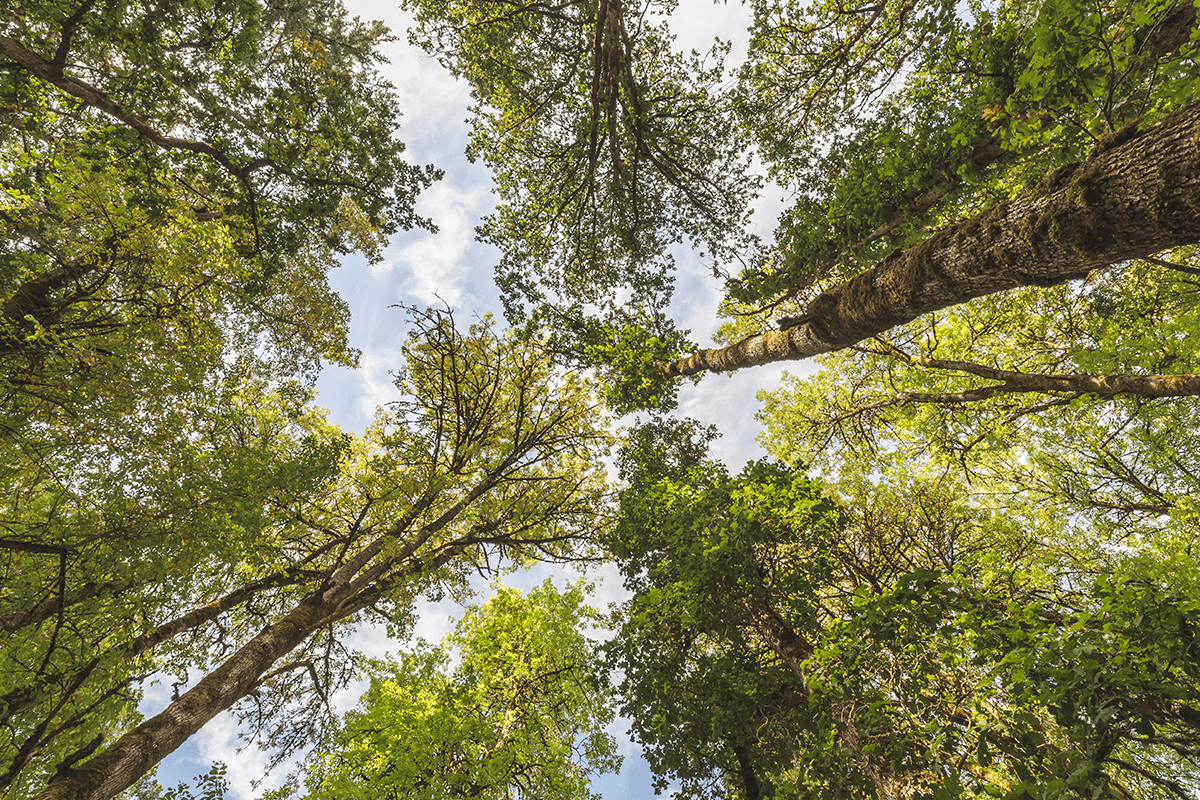Trees are truly amazing—not only do they provide us with shade, beauty, and habitats for wildlife, but they also clean the air we breathe. Yes, that is right—trees are air-cleaning machines! In this article, we will dive into how trees clean the air and why we should appreciate their natural air-purifying abilities.
 Aerial view of a forest.
Aerial view of a forest.
What's in the air we breathe?
Before we dive into how trees clean the air, it's important to understand what's in the air we breathe. The air we breathe is made up of a variety of gases, including oxygen and greenhouse gases such as nitrogen, ozone, methane, and carbon dioxide (CO2). CO2 absorbs and radiates heat, leading to changing environmental conditions. There are also a variety of pollutants in the atmosphere that can be harmful to our health. These pollutants include:
- Particulate matter: tiny particles of dust, dirt, and other materials that can be inhaled into our lungs;
- Ozone: a harmful gas that can irritate our respiratory systems;
- Nitrogen oxides: (greenhouse) gases that are released by cars and other sources of combustion, which can cause respiratory problems; and
- Sulphur dioxide: a gas that can cause respiratory problems and contributes to acid rain.
Why are trees important for cleaning the air?
Trees are important for cleaning the air for a number of reasons. Firstly, they absorb CO2 through a process called photosynthesis, which is when they use sunlight to convert CO2 and water into oxygen and glucose. This process helps to reduce the amount of CO2 in the atmosphere.
Read more: How does the carbon cycle work?
Secondly, trees also absorb pollutant gases from the air through tiny pores in their leaves. These pores, called stomata, allow the tree to take in CO2 and other gases it needs for photosynthesis. However, they also absorb pollutants like ozone and nitrogen oxides. Once the pollutants are absorbed, they are broken down by the tree and either used for growth or stored in the tree's tissues.
 The back of a lemon tree leaf.
The back of a lemon tree leaf.
Finally, trees can also reduce the amount of particulate matter in the air. When trees are located next to busy roads or other sources of pollution, they can act as a barrier, trapping the particulate matter before it reaches our lungs. Most of the particles are trapped on the leaves’ surface, removing them from the atmosphere, and then washed off by the rain.
How effective are trees in cleaning the air?
The amount of pollution that trees can absorb depends on a few factors, including the tree species, its age and size, and the amount of pollution in the air. Generally, mature trees are more effective at absorbing pollutants than younger trees, as they have larger and more leaves.
According to research conducted by the US Forest Service, a mature tree can absorb up to 21 kg of CO2 per year. This is equivalent to the CO2 produced by driving a car for 41,000 km. In addition, a mature tree can also absorb up to 1,000 times more particulate matter than a younger tree.
 Forest with very tall, mature trees.
Forest with very tall, mature trees.
Read more: A complete guide to planting trees: tips, benefits, and more
What can we do to help trees clean the air?
While trees are amazing air-cleaning machines on their own, there are a few things we can do to help them do their job even better. Here are a few tips:
- Plant more trees: If you have the space, planting trees is a great way to help clean the air in your neighbourhood. Choose a tree species well-suited to your local climate and soil conditions to ensure the tree offers optimal benefits.
If you don’t have the space, let us do it for you: plant a tree with DGB
- Support local conservation efforts: Many local organisations work to protect and preserve forests and natural habitats. Supporting these organisations through donations or volunteering can ensure trees continue to clean the air for generations to come. You can also choose to invest in green initiatives or choose recurrent tree-planting subscriptions to support conservation efforts.
Discover the benefits of DGB’s 8% green bonds
- Reduce your carbon footprint: While trees are great at absorbing CO2, we can all do our part to reduce the amount of CO2 we produce. This can include walking, biking, or taking public transportation instead of driving, using energy-efficient appliances and light bulbs, and supporting renewable energy sources like solar and wind power. The need for more carbon strategies also extends to businesses, and where it’s not possible to reduce anymore, they can opt for compensating for their emissions.
Calculate your carbon footprint now
Trees are at the heart of DGB Group’s mission
For us, at DGB Group, it is clear that trees are essential for the future of our planet. Trees provide us with the oxygen we need to breathe and play a critical role in paving the way for a more sustainable and healthy future for all by absorbing carbon dioxide and other pollutants from the air. The importance of trees cannot be overstated, and it is up to all of us to ensure that we protect and preserve these vital natural resources for generations to come. Through our large scale reforestation and afforestation projects, we help our planet do what it does best—support us all. By planting trees, supporting conservation efforts, and reducing our carbon footprint, we can do our part to create a healthier, more sustainable future for ourselves and the planet.
Join us in shaping a better future for all—contact our experts



